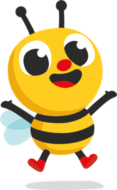Everyday experiences to support your child's maths skills
Children learn about mathematical concepts through practical experiences where they have the opportunity to explore and experiment in a range of situations. They relate to everyday experiences that are meaningful for them.

You can help your baby to develop their maths skills by:
Placing items that make a sound, such as scrunched up paper, by baby's feet while they are laying down or sitting in a bouncy chair. As baby moves their feet and hears the noise they are learning about cause and effect!
Pointing out size differences during everyday activities, for example "Daddy's big spoon, baby's little spoon!", while holding them up for baby to see.
You can help your child aged 1-2 to develop their maths skills by:
Using number names in context during routine activities; for example as you get your child dressed you could say "One, shoe, two shoes! You have two shoes!"
Collecting together a variety of items of the same colour, for example a green sock, a green cloth and a green brick. Show your baby the items and then ask them if they can see anything else that is green?
You can help your child aged 2-3 to develop their maths skills by:
Asking number related questions while reading stories, for example "I wonder how many elephants there are in this story?"
Playing a sock matching game at home. Collect together a range of different socks and invite your child to match them together. You can talk about the different patterns and colours on the socks as you explore.

You can help your child aged 3-4 to develop their maths skills by:
Wrapping up everyday objects in foil and invite your child to guess what they might be!
Predicting what will happen next in a story, for example "I predict that the alien will run away back to space!" Invite your child to make their own predictions.
You can help your child aged 4-5 to develop their maths skills by:
Making a tally chart with your child, encouraging them to represent information using marks. For example you could draw simple pictures of things you might find in the garden such as flowers or worms and invite your child to add a tally mark each time they find them.
Giving your child a range of everyday objects to order by size, weight or length. For example you could give them a range of different fruits, containers or cardboard boxes.
UP for Educators
UP provides our educators with a wealth of quality learning experiences and essential guidance. UP pushes the boundaries to deliver even better learning outcomes, giving Busy Bees children the very best start in life. There is something on UP for all educators; download UP and see how this can enhance your practice today!








